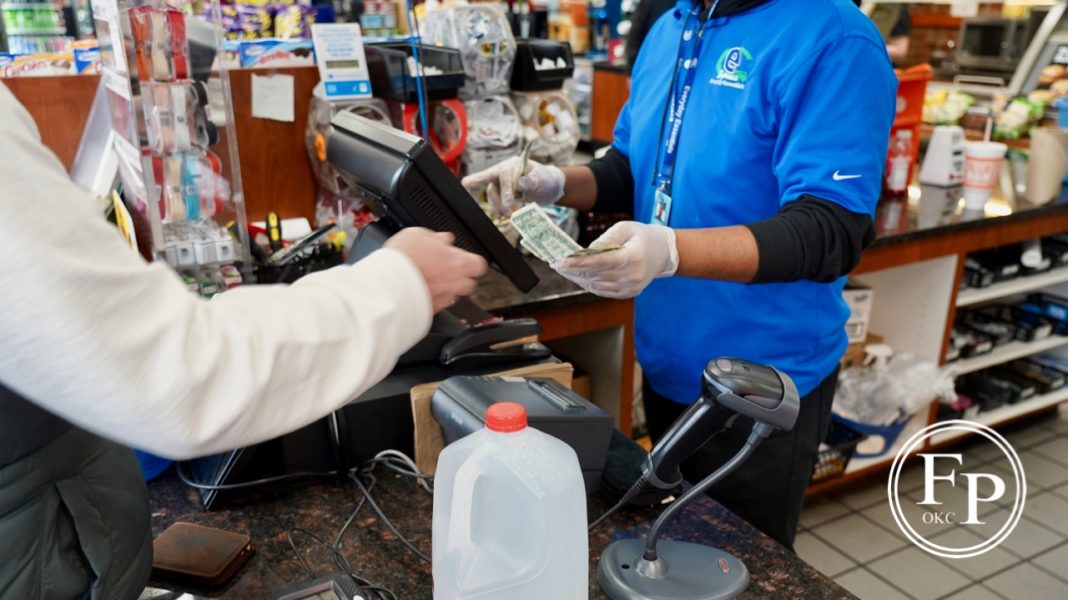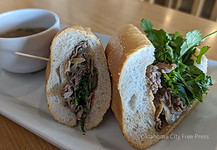Last Updated on April 17, 2020, 10:48 AM | Published: March 27, 2020
Some companies take care of their employees without being compelled to and some don’t. And in this time of the pandemic, those essential workers who are still expected to interact with the public face daily perils.
Super Cao Nguyen, Oklahoma City’s oldest ethnic grocery store, is taking proactive steps to protect their employees who have to face the public all day.
They started implementing policies to protect public health several weeks ago, including providing their employees with increased protections like a barrier between customers and cashiers, adding more hand sanitizing stations, and checking employees for fever before they begin work each day.
They are also dedicated to providing financial assistance to their employees should one need to take time off due to illness.
“We’re a family-owned business. We’ve been in business in Oklahoma City for over 40 years,” said Bo Luong, VP of Operations at Super Cao Nguyen. “I view my staff as my extended family because a lot of them have been with us over ten, 20 years and my entire family works in the grocery store. This is our livelihood.”
“We’re going to do everything we can in our power to protect not only us but them as well too and our customers for that matter,” he added. “We’re taking this as seriously as possible and we’re taking every precaution that we can control.” said VP of Operations Bo Luong when we talked today.”
But since not every employer has this level of commitment to their employees, the federal Occupational Safety and Health Administration was created to protect workers.
OSHA Guidelines
While some businesses are following OSHA/CDC guidelines, Free Press has been getting tips that many are not.
Workers are concerned for their own safety and the consequences to their families should they accidentally bring home an infection. Workers have also expressed concern about their company’s directives regarding leave if they get sick.
The federal government has released guidelines for companies and workers during the Coronavirus outbreak. The guidelines include instructions for employers on how to keep essential workers safer, and how to prepare workplaces to protect human health.
Risk levels
OSHA separates workplaces into three main groups based on the risk level to employees. High-risk jobs include frontline healthcare workers and others who work in areas where the infected congregate.
Grocery stores, public transit, restaurants and other areas where there is frequent interaction with customers are considered medium risk.
Medium risk jobs have suggested guidelines such as encouraging frequent handwashing, providing tissues and trash receptacles for workers and customers, and increasing cleaning schedules.
OSHA recommends putting a physical barrier like a glass panel between customers and cashiers if possible and using no-touch systems when possible and disinfecting areas that are medium/high touch regularly. (See the Super Cao Nguyen illustration above.)
Workers rights
Even if you are in an at-will employment state like Oklahoma, and even if your workplace does not have a union you have rights to a safe workplace and federal law protects workers who make complaints about concerns regarding health and safety.
The National Labor Relations Act of 1935 protects workers who join together to address health and safety risks in their workplace. According to the law, a concerted action includes a group of two or more people who join together to address urgent health and safety risks in their workplace, and those actions are protected meaning your employer cannot fire you in retaliation.
It is important to know that even if you did not have sick leave available before, new regulations are in place to help you in the event you need time off.
A law called Families First Coronavirus Response Act (FFCRA or Act) requires some employers to pay two weeks of sick leave at your regular pay rate if you are told to quarantine by your state or local government or a healthcare professional.
You can also receive 2 weeks of sick leave paid at ⅔ your regular rate if you need to stay home to care for a family member or child that is in quarantine.
Also, up to ten weeks of paid leave is available for some workers who need the time off to care for a child if their school or daycare has closed.
COVID-19
Workers are also expected to stay home if they are experiencing symptoms of COVID-19 like fever, cough, or shortness of breath.
The current recommendation is to call your primary care physician for instructions before coming in, most people with COVID-19 can recover at home, and testing is still limited. People without an established relationship with a doctor can still call their local department of health for advice.
Oklahoma County Department of Health can be reached by phone at 405-425-4489 Monday through Friday from 8:30 a.m. to 4:30 p.m. Oklahoma State Department of Health has a hotline that is open 24 hours a day 7 days a week and can be reached by phone at 1-877-215-8336.
Reporter covering the intersection of local politics and Oklahoma families. || Intellectual magpie, and hoarder of datasets. I ❤️ OKC. || When not writing Joey can be found researching light pollution in Oklahoma and visiting Oklahoma schools with her portable planetarium.











